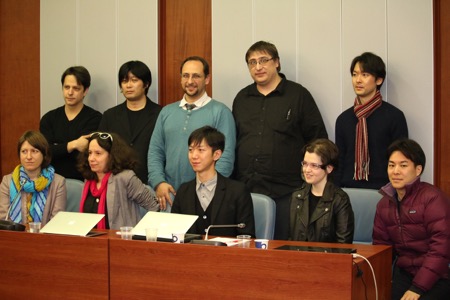[Report] International Forum “The Sublime and the Uncanny” (2)
This entry follows from “[Report] ‘The Sublime and the Uncanny’ (1).”
What is a “center?” Here, let us think not about the relationship between a point, a line, and a plane, which people often talk about, but rather about the relationship between a point, a line, and a circle. If you have two points, you can draw a line between them. And if you fix one point and rotate the other around it, a circle would appear. Then, what looks like a circle at first sight may in fact only be a point. The “center” is essentially the central point of a circle. The location of this point shifts incessantly, according to which the circle continues to transform or to “metamorphose.”
In March 2015, I participated in the international forum “The Sublime and the Uncanny” co-organized by the University of Tokyo Center for Philosophy (UTCP), the Sofia Literary Theory Seminar (SLS) and the Cultural Centre of Sofia University – there are at least two “centers” here. The academic exchange between UTCP and Sofia University had already started in 2013 with the international symposium “Metamorphosis and Catastrophe,” but I imagine the two exchanges held by the two centers – the two points – have different characteristics. For example, we can compare the two organizers from UTCP: Prof. Yasuo Kobayashi who organized the first exchange and who has retired from the University of Tokyo this spring, and Dr. Futoshi Hoshino, organizer of the second forum, who is more than thirty years younger than Prof. Kobayashi. This year’s forum has been realized by young scholars, and thanks to the atmosphere created by this younger generation, I, as a PhD student, was able to participate in it without any hesitations.
In this forum, we not only had presentations on the notions of “the sublime” and “the uncanny” proposed by each of the two centers, but also discussion time on the texts by Kant and Freud. This discussion allowed the participants to interactively and freely exchange their opinions, which I think enabled the whole forum to gain more depth. I felt that a forum with such a mixture of styles would be a good model for an international academic exchange.
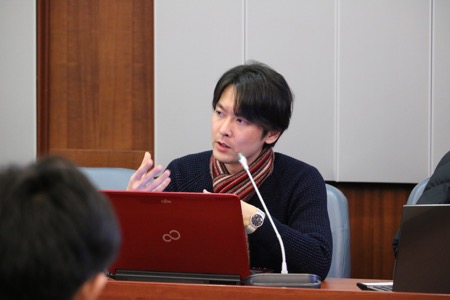
In my presentation, which I gave on the 4th of March, I tried to compare some ideas of Jean-Paul Sartre, on whom I am working, with those of Julia Kristeva, a theorist from Sofia. I have been interested in this relationship, seldom studied, between the two thinkers and have been engaged in this research for several months, so I was happy to have an occasion to give the first presentation on this topic in Sofia. In my presentation, I summarized references to Sartre that Kristeva makes in her texts, introduced her lectures from the 1990s on Sartre, then compared the two important notions “abjection” and “revolving door” (“tourniquet” in French) from the viewpoint of the “hinge,” and proposed a new image of Kristeva as a “post-existentialist.” After the presentation, Prof. Darin Tenev let me know an important fact about Kristeva before she left for Paris. According to him, when she was in Sofia, she was more influenced by existentialism rather than structuralism. This was for me an important revelation, since I did not know much about Kristeva’s pre-history. I would like to take this opportunity to express my gratitude to him. (Of course, the Boyana Church to which he guided us during our free time is also unforgettable!)
I would also like to thank to Dr. Kamelia Spassova, the organizer of this forum from Sofia, Prof. Boyan Manchev, one of the most important friends of UTCP, and all participants from Sofia who have been truly hospitable to us. Wishing all the best that the two points / centers will continue drawing many different circles...
-Hisato Kuriwaki (UTCP)
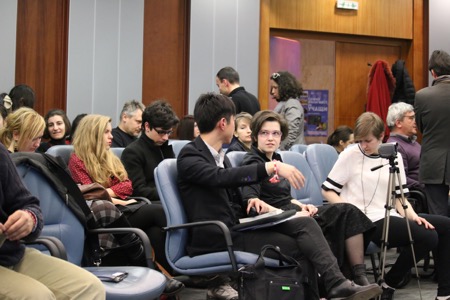
I attended an international forum “The Sublime and the Uncanny” from the 2nd to the 4th of March at Sofia University in Bulgaria. For me, it was the first time to give a presentation in English in a foreign country.
There is a long story, including the indirect causes, of exchanges between Bulgarian and Japanese researchers that led to this forum: Prof. Boyan Manchev’s visit to Japan, a film screening by Prof. Yuji Nishiyama and their conversation in Sofia, Prof. Yasuo Kobayashi and other Japanese researchers’ visit to Bulgaria to participate in the forum “Métamorphose et Catastrophe,” and Prof. Darin Tenev’s long-term exchange with Japanese scholars. All these ongoing academic exchanges made our forum possible. Through participating in the forum, I became aware of the importance of continuing such exchanges, and realized the responsibility for making a contribution to that.
Our forum started with the keynote given by Dr. Futoshi Hoshino who offered a lucid outline of contemporary aesthetic theories. Then we had two days of the forum, including workshops, based on the primary texts on the sublime and the uncanny, followed by individual presentations. As a result, we could have fruitful discussions on many topics. Based on the essential theories by Kant and Freud, we had an exchange on many topics referring to the literary works and films as well.
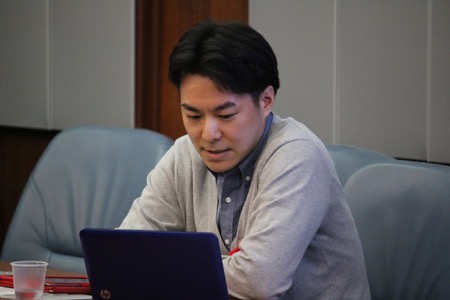
I gave a speech about Jacques Derrida’s notion of the history as “the difference of forces,” considering his reading of Heidegger and Nietzsche. Heidegger, as a result of his efforts to save Nietzsche from a bio-logistical interpretation, and to make a distinction between the thesis which Dasein poses for animals in general and the zoological thesis, and which cannot avoid falling into the traditional metaphysics and overlooks a certain kind of difference. To give the condition of possibility to one thing results in the impossibility of another. Nietzsche examined this exchange as the theme of “will to power.” Derrida, through reading these two thinkers, considered the history as the difference of forces.
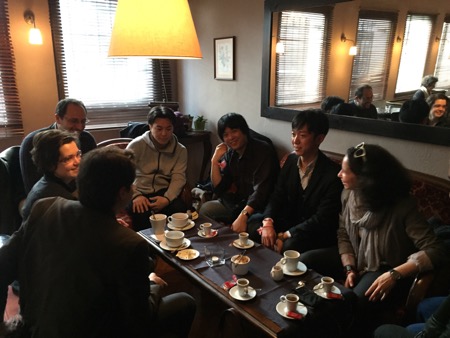
Finally, I would like to mention the very warm and kind reception given by the professors, students, and their friends: they welcomed us at the airport late at night; they showed us important places and monuments in Sofia; they gave us many gifts such as Bulgarian traditional ornaments, their literary magazines, and books of previous symposia; and they kindly invited us for dinner to continue our conversations even after the forum. I was impressed by the fact that all these kinds of receptions were given by the professors and students together. At the last dinner, I conveyed such an impression to Dr. Enyo Stoyanov; and he told me that they have an “openness” for dialogue, which I will never forget. I thought it was this “openness” that brought about the fruitful exchanges among the professors and students and their warm and kind reception for us.
-Takafumi Shimada (The University of Tokyo)
